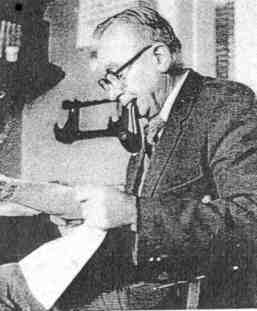The veil is used to hide all sorts of things
From human eye that curious always is.
It always inquiring mystery brings?
Which not always repudiated is.
Just think of slender delicate veil,
That is moving air so gently sways,
Giving lusty inner trills,
As some parts of art, on which it does prevail,
Are enhanced, but no concealed.
Thus many, many years ago,
Our ladies men's attraction did cunningly
conceive,
To make them forward go,
They pretended their beauty (or else)
From them to thus conceal.
There are, however, veils
In many other, oft' morbid forms,
That on our nature much prevail,
And of the hidden thing do us morbidly inform.
Such thing that cover something like a cloud,
Something lying cold and stiff.
The veil is then called a "shroud",
And it give us the solemn grief.
Alas 'though, let us not forget, that many a
jester's laugh
Is his cunning veil
Of things which we would all regret,
If we could see them well enough,
If the jester did not our view of them curtail.
For he tries and tries again
His somber message to convey,
But the veil of humour covers
All that he portrays,
And his efforts are in vain.
There is, however, one good thing,
Which the jester from this derives:
When on precipice's brink,
The just on danger thrives,
And thus the jester with his jest survives.
Yet, there is another veil,
Which defies all descriptions,
Of which many people themselves avail,
And which deserves our vehement proscription.
We see this veil often as a smile,
That bids approach and trust.
It is there to the recipient sordidly beguile,
And to deliver the final crush.
This veil is often in the form of bread,
Hiding the object of real intention,
Which contains a deadly spread,
Which the giver does not mention.
My veils preferred are those, which do reveal
The objects which they to cover are supposed,
Giving them an enhanced appeal,
And thus many thoughts they do propose.
The gentle mist of our beloved Turner,
That veils so many shapes of promise,
Which leads us like humble learners,
And gives us an inner solace.
The gentle mist that spreads at night,
When traveling though fields and forests.
It all gives us a sense of peace and great delight.
These are the veils that are true and honest.
1986
|
